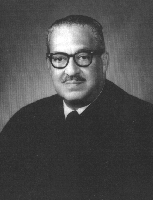|
|

Thurgood Marshall: Civil Rights Advocate
|

|
|
Share This Page
|
|
|
|
|
|
|
Follow This Site

|
 |
|
|
|
|

|
Part 2: His Life's Work
Of the 32 cases he argued before the Supreme Court, Marshall won 29 of them. This success convinced President John F. Kennedy to appoint him to be on a federal Appeals Court, in 1961. There again, Marshall met opposition, this time from white Senators who didn't want segregation to succeed. He was on the court for the first several months "on a provisional basis" before his appointment was  approved. As a member of the Appeals Court, Marshall wrote 150 decisions. Of those, 98 were majority decisions, and none of those was overturned by the Supreme court. He served for four years and was then appointed Solicitor General, a very powerful position. That person argues the U.S. Government's case before the Supreme Court. In that capacity, Marshall argued 19 cases before the Court and won 14 of them. approved. As a member of the Appeals Court, Marshall wrote 150 decisions. Of those, 98 were majority decisions, and none of those was overturned by the Supreme court. He served for four years and was then appointed Solicitor General, a very powerful position. That person argues the U.S. Government's case before the Supreme Court. In that capacity, Marshall argued 19 cases before the Court and won 14 of them.
In 1967, President Lyndon Johnson, who had appointed Marshall Solicitor General, appointed him to the Supreme Court. His nomination was approved, and he became the first African-American on the Court.
A powerful and tireless voice for civil rights and for minorities in general, Marshall served on the Court for 24 years. He consistently opposed the death penalty, routinely writing that it inherently violated the Eighth Amendment protection against "cruel and unusual punishment." He also consistently upheld and worked to expand the rights of women, children, prisoners, and the homeless.
 Ill health forced Marshall to retire from the Court in 1991. He died two years later. Ill health forced Marshall to retire from the Court in 1991. He died two years later.
Marshall was married twice and is survived by one wife and two sons. His first wife died of cancer in 1955. His surviving sons are from his second marriage. Many schools and other buildings have been named after him.
First page > Foundation for His Struggle > Page 1, 2
|
|



 approved. As a member of the Appeals Court, Marshall wrote 150 decisions. Of those, 98 were majority decisions, and none of those was overturned by the Supreme court. He served for four years and was then appointed Solicitor General, a very powerful position. That person argues the U.S. Government's case before the Supreme Court. In that capacity, Marshall argued 19 cases before the Court and won 14 of them.
approved. As a member of the Appeals Court, Marshall wrote 150 decisions. Of those, 98 were majority decisions, and none of those was overturned by the Supreme court. He served for four years and was then appointed Solicitor General, a very powerful position. That person argues the U.S. Government's case before the Supreme Court. In that capacity, Marshall argued 19 cases before the Court and won 14 of them. Ill health forced Marshall to retire from the Court in 1991. He died two years later.
Ill health forced Marshall to retire from the Court in 1991. He died two years later. 
